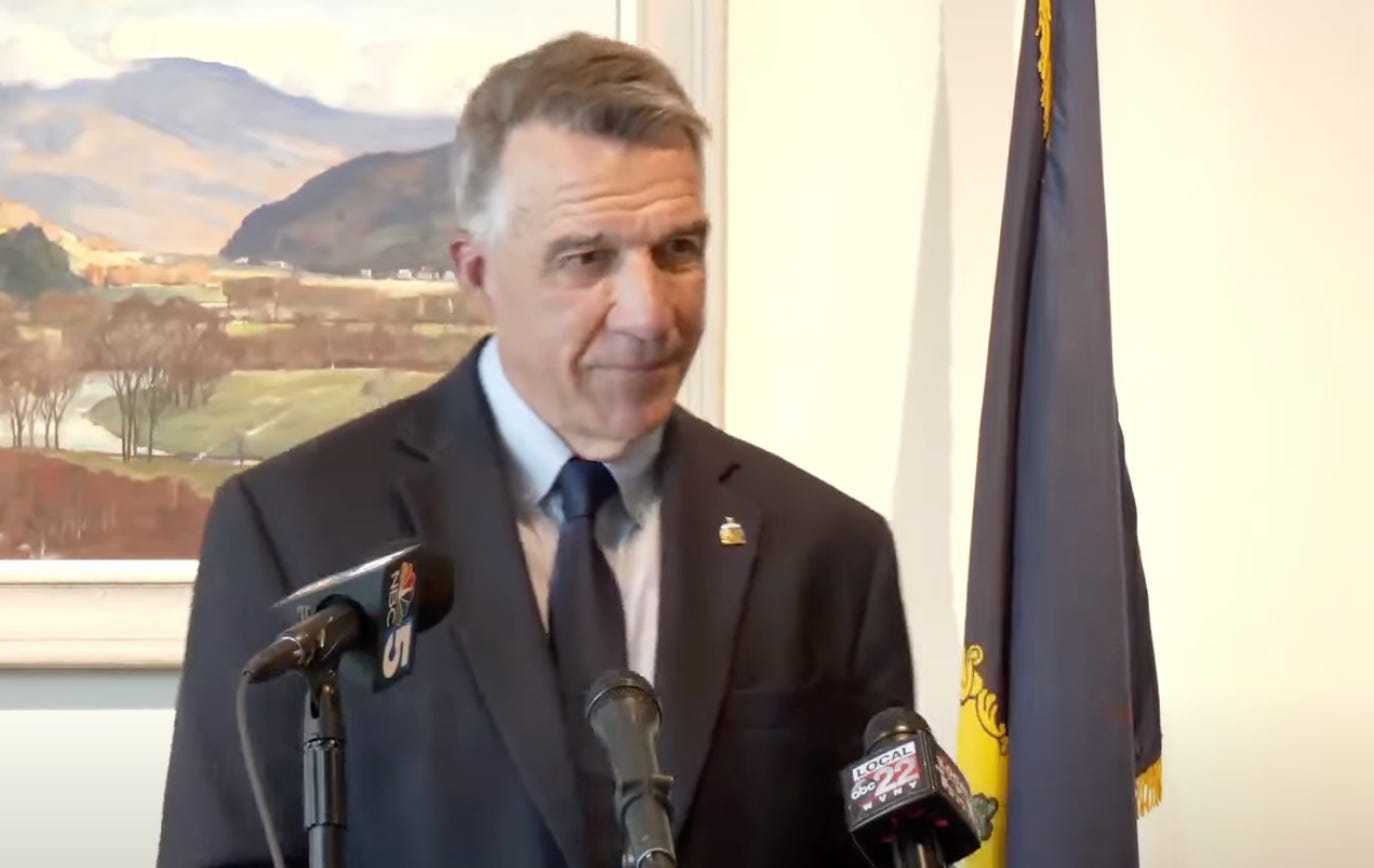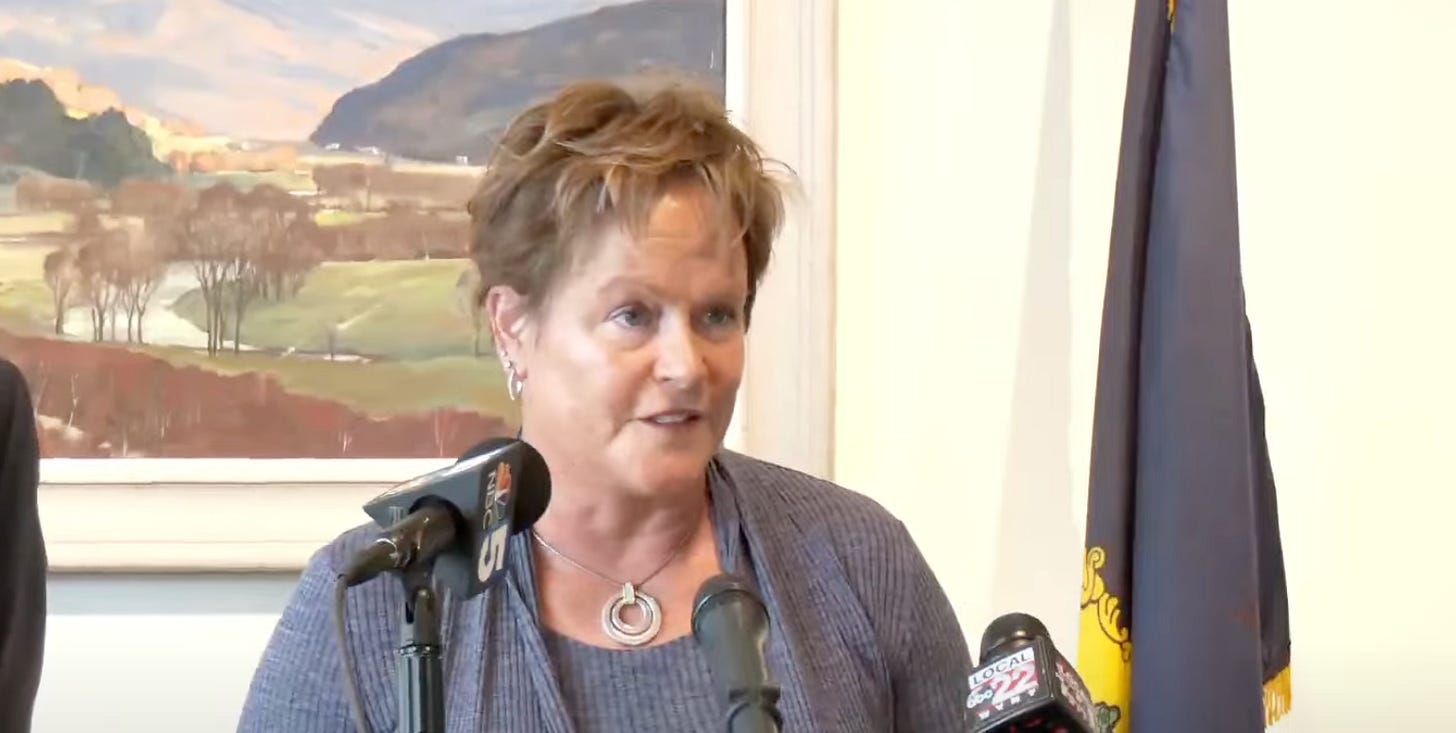‘Not Overnight, and Not the Governor’: Exchange at Scott Presser Puts Burlington’s Crime and Economy in the Spotlight
At a press conference, questions about Burlington’s struggles lead to a sharp back-and-forth — and a rare on-mic intervention by Vermont’s public safety chief.
MONTPELIER — Aug. 20, 2025. Crime, drugs and a sluggish downtown economy in Burlington dominated a tense stretch of Gov. Phil Scott’s press conference Wednesday, culminating in Public Safety Commissioner Jennifer Morrison stepping to the dais to defend the state’s posture and to argue that Burlington’s challenges stem from years of local policy choices.
The exchange was sparked by WCAX reporter Ike Bendavid, who pressed Scott on what the state is doing “to help Burlington,” citing stagnant retail and restaurant growth and what he described as open drug use and crime downtown. Bendavid said he was quoting Burlington Mayor Emma Mulvaney-Stanak from a recent town hall with “hundreds of businesses,” adding that she told attendees the governor “has not been a strong partner in this.” The questions and answers below are drawn from a transcript of the exchange provided from the press conference.
Scott: Burlington’s issues are multifactor, and the state hasn’t been asked for help
Scott pointed to a “combination” of headwinds — including construction disruptions, the “Canadian tariff situation” affecting cross-border visitors, and “a lack of maybe enforcement” — as factors “not a good mix for economic vitality,” according to his remarks.
When asked what he is doing specifically, Scott said Burlington is “our largest city,” but pushed back on the idea that it is “the economic engine,” noting strength elsewhere in Chittenden, Franklin, Lamoille and Washington counties. He added that Burlington’s public works are “city projects, they’re not state projects,” and said, “We haven’t been asked to do anything [by Burlington]. But if they are in need, we would be happy to assist in any way we possibly can,” according to Scott.
Pressed on the mayor’s claim that she has invited him to engage, Scott replied, “I don’t recall any of that. But we’ll look back and see what correspondence we received,” according to the exchange.
I don’t have to walk down Church Street to see and appreciate what’s going on there
A noticeably agitated Bendavid then zeroed in on optics and proximity, asking when Scott had last walked Church Street or City Hall Park. Scott acknowledged he had not been there on foot “recently,” saying he had been to Burlington “a number of times over the last few years” but that he “drive[s] through,” adding, “I don’t have to walk down Church Street to see and appreciate what’s going on there,” according to the transcript.
Asked what message that sends to businesses reporting steep declines, Scott answered that “a lot of other Vermonters…are avoiding Burlington as well,” before reiterating that the state is “all ears” if Burlington’s mayor and council ask for “specifics,” according to his comments.
Morrison steps in: ‘Years and years of decisions’ led to Burlington’s situation, and the state is already engaging
Shortly afterward, Commissioner Jennifer Morrison — a former Burlington interim police chief and longtime law-enforcement leader — asked to speak. Morrison said that Burlington’s current state did not “happen overnight,” but is the result of “years and years and years of policy decisions, budgetary decisions, [and] City Council decisions,” according to her remarks.
Click below to see a clip of Morrison’s comments.
https://www.youtube.com/clip/UgkxK07aaEHLSeWJokEsrhiIdLxBWUHdBvT0
Morrison said state agencies “do engage with the city of Burlington… quite regularly,” pointing to a recently funded “Situation Table” initiative — paid for with a federal grant — that convenes stakeholders to intervene with people at “acutely elevated risk of harm or overdosing or recidivism,” according to Morrison. She emphasized that effective public safety requires “commitments to prosecute and detain people who continue to harm the community” and to “shift the pendulum back to the middle so that the use of public spaces is just as important for law-abiding people and businesses to thrive,” according to her comments.
Morrison said she “resent[s] the implication… that somehow Governor Scott is responsible for anything that has happened in the Queen City,” adding that the state “work[s] in partnership with communities who need state-level resources because they’ve exhausted the local resources,” but “can’t be the ones directing the work,” according to her statement.
The mayor’s charge — and what’s been verified
Bendavid attributed to Mayor Mulvaney-Stanak the statement that Scott “has not been a strong partner,” citing the business town hall. Scott said he did not recall invitations to partner and would check correspondence, according to the transcript. As of the press conference exchange, the governor did not concede that a request had been made; nor did he outline a specific ask from Burlington that the state had declined.
This story is based on the Aug. 20 press conference exchange. The precise wording and context of the mayor’s town-hall comments referenced by Bendavid were not independently presented at the podium during the exchange.
Bottom line
From the podium, the state’s message was that Burlington’s problems are real but rooted in local decisions over many years — and that while the state is already engaged through efforts like the Situation Table and could do more, it expects clear, specific requests from city leadership. The press-room back-and-forth illuminated a widening gap between Burlington officials’ public frustration with the pace of recovery and the state’s insistence that durable change will require local accountability, enforcement choices, and prosecutorial follow-through — not a quick fix from Montpelier.
Source: Exchange at Gov. Phil Scott’s Aug. 20, 2025 press conference, including remarks by WCAX reporter Ike Bendavid, Gov. Phil Scott, and Public Safety Commissioner Jennifer Morrison, as provided in the transcript.




